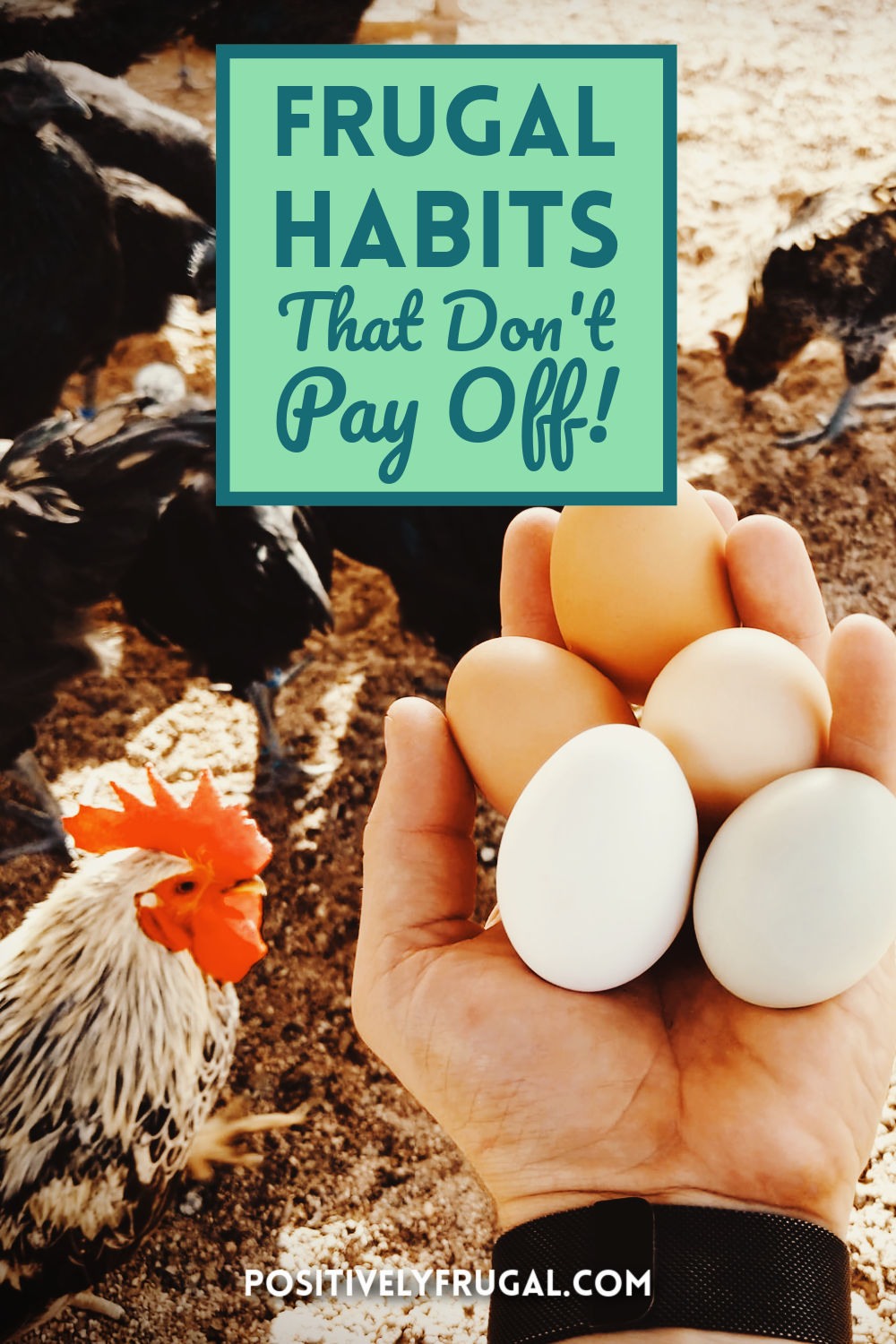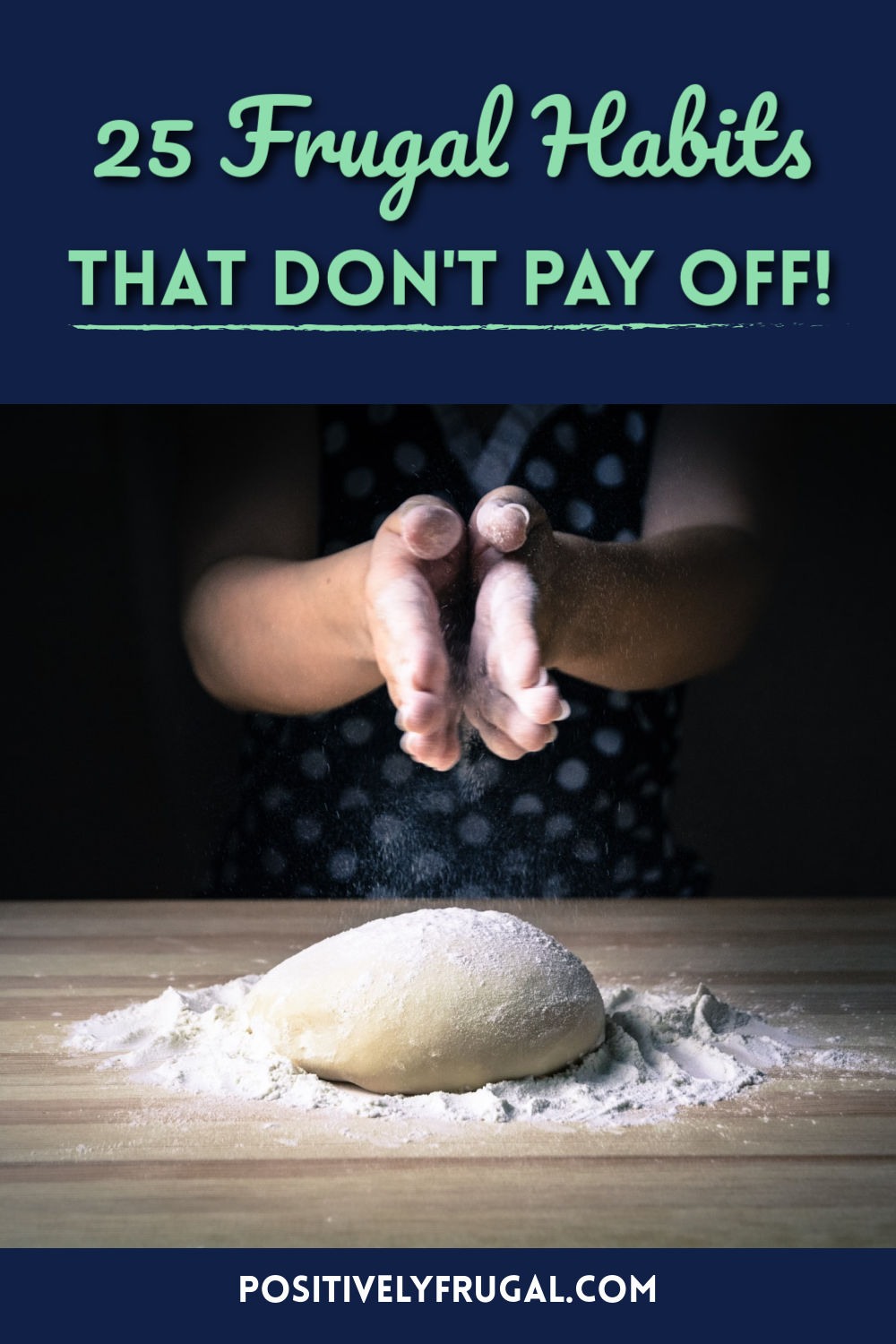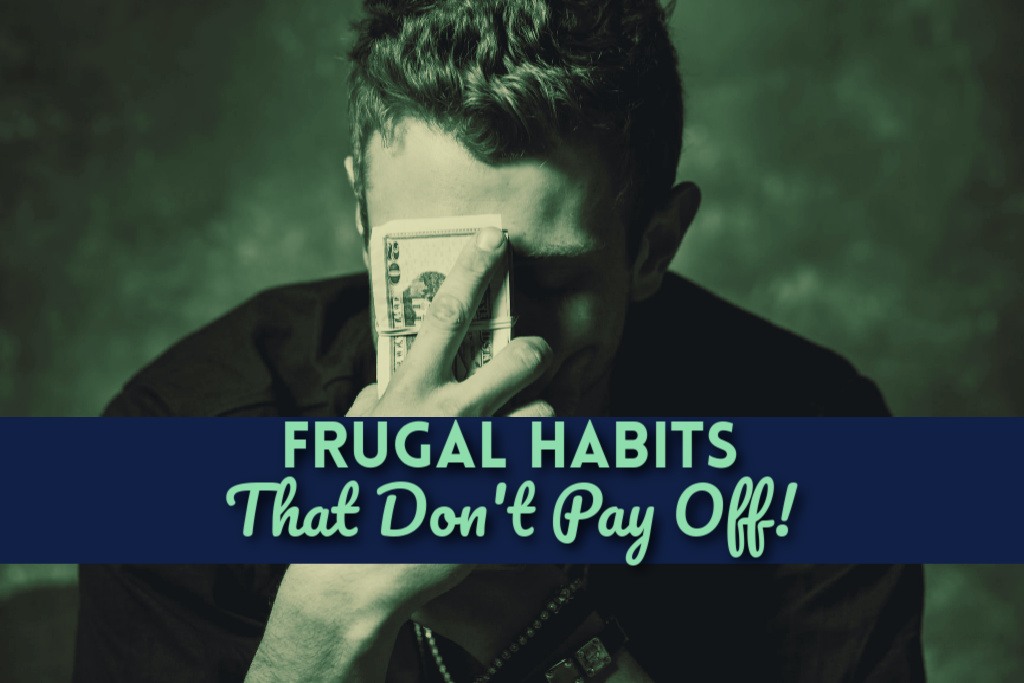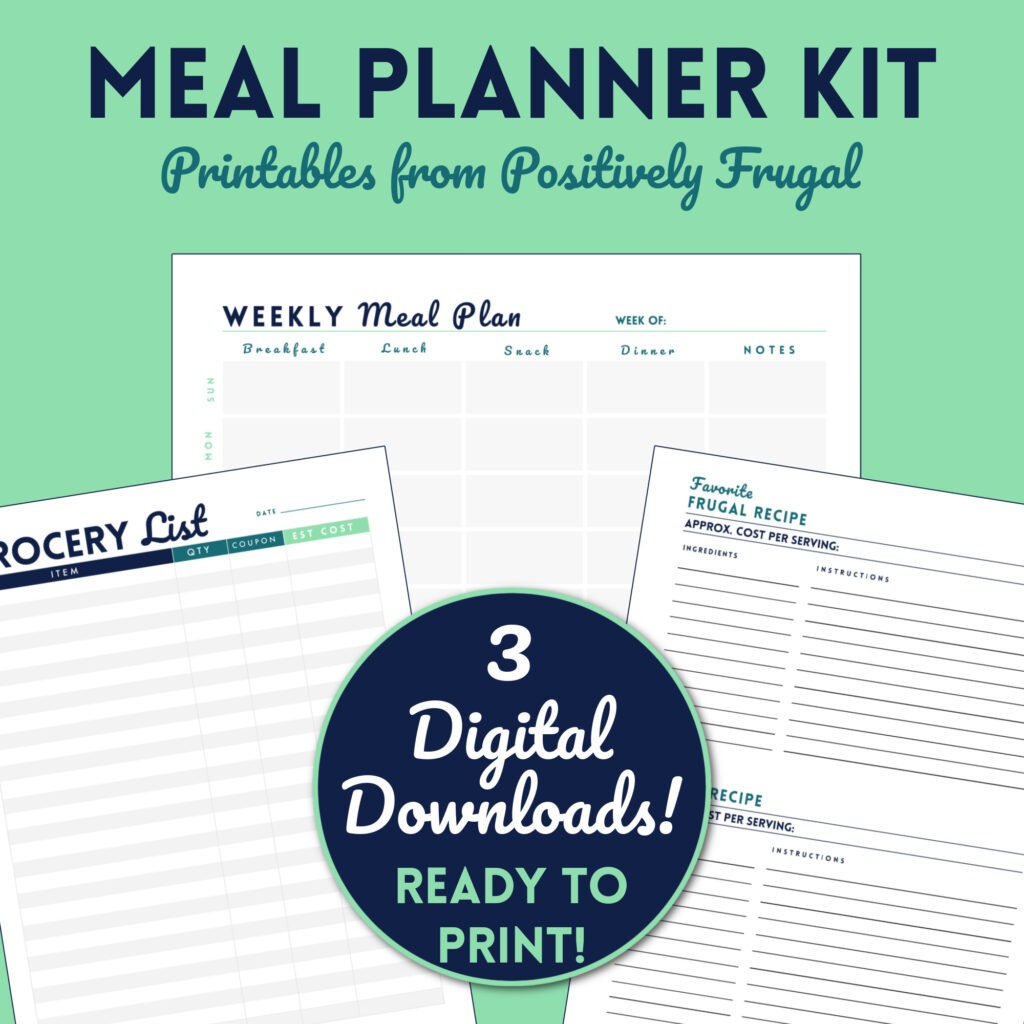Some of the links on this site are Affiliate Links and if you use them to make a purchase, we may earn a commission. For more information, read our Disclosure Policy.
Frugal living is a surefire way to boost your finances. There are tried and true habits of frugal people that prove frugality saves money – from cooking your own meals to finding free entertainment. That said, not all frugal habits pay off in the end.
Creating Frugal Habits to Save Money
As a person who is frugal and thrifty, my overarching goal is to spend less and save more.
I challenge myself to seek out new and different ways to save a dollar – and I am not afraid to test out any frugal budget tips that come my way. However, before I adopt new habits, I calculate if the frugal saving ideas are indeed worth it.
On my quest to be frugal, I have discovered that there is a lot more to the bottom line than the up-front cost. Gimmicks and quick-and-easy fixes are common stumbling blocks to frugality. The best frugal habits to live by are long-term endeavors, not cheap tricks.

FRUGAL HABITS THAT DON’T PAY OFF
I have rounded up a list of the top offenders to frugality. From spending more in order to save a little to cutting corners to keep costs down, I’m highlighting some of the most expensive frugal habits.
#1 Keeping Chickens for Free Eggs
There is no question that eggs are an excellent cheap source of protein; in fact, many of my favorite frugal meals use eggs. As a frugal-minded person, I began pondering if it would be worth it to keep chickens just for the free eggs.
I dug around a little and learned that chickens are pretty expensive to keep. According to The Hen House Collection, those “free” eggs are going to cost a pretty penny and are quite possibly not one of the frugal living habits.
The estimated cost for keeping five hens for five years – including the coop, bedding, feed and vet bills – comes out to just about $70 per month.
This is not to say that keeping chickens as pets isn’t rewarding and entertaining…but it definitely does not pay to own chickens just for the free eggs. In fact, this might be a way that being frugal can cost you money.
#2 Using Cheap Toilet Paper and Paper Towels
When you are at the grocery store trying to select the most economical paper products, it can be tempting to simply grab the cheapest pack.
If you calculate the price-per-unit (one of my top frugal shopping tips!), the math will likely point you into the direction the cheapest pack…but is it really the best choice?
The problem with cheap, 1-ply toilet paper and ultra-thin paper towels is that you have to use so much more of it to get the job done. And, if you are using more, then you are not really saving. The cost of being frugal with cheap paper products is not only in the dollar amount, but in the frustration of an inferior (sometimes unusable) product.
A much better thrifty habit when grocery shopping is to buy a low-priced option that actually works! Better yet, a frugal person might look at eliminating paper towels completely and investing in reusable, washable towels instead.
Along the same lines, be mindful of the dish soap you buy. Here’s the secret, the cheapest brands often require twice the amount to get your dishes clean – which won’t save you any money at all!
#3 Taking on DIY Projects and Crafts
Do-It-Yourself projects are fabulous frugal ideas…until they aren’t!
While it is true that many frugal DIY projects can save you money, some end up costing a small fortune. (Making homemade costumes is a classic example!)
Materials and time are the two biggest costs to consider when taking on new projects. Estimate the cost of all the materials and gadgets required for the project – and then add in your time – to find out if it will be cost effective before you start.
Starting a DIY project before pricing it out can be a bad frugal habit to get into.
#4 Buying Things Just Because They Are On Sale
Sales are a no-brainer for frugal people. Buying things when they are on sale is fantastic for a frugal budget.
That said, there is a big difference between stocking up on products you use (and need) when they are discounted and getting swayed into buying things (that you really don’t need) solely because they are on sale.
It’s an easy trap to fall into – I’ve been guilty of it on more than one occasion. But falling for it time and again is a big no-no for frugal spending habits.
To keep myself on track, I always have a list when I’m shopping – like my Budget Grocery List – and I stick to it!
#5 Couponing
Using coupons has long been touted as one of the best frugal habits – but there are numerous reasons why couponing doesn’t add up to big savings.
First, most coupons are for pricey name brands. Even with the coupon, the product is usually still more expensive than the store brand alternative. Yes, you will get the name brand for a cheaper price by using a coupon, but you are not really saving money if you can buy a similar product for less. Therefore, one of the top frugal tips for saving money is to simply buy the store brand product.
Second, it takes an enormous amount of time to clip and use coupons. Not only do you have to sift through hundreds of coupons in the paper and online, but at the store you need to track down the exact product. When living a frugal lifestyle, it is important to value your time.
Finally, when you scour the coupons, you are allowing a marketer right into the door of your mind. You become more susceptible to buying things you don’t need.
While I am not a big proponent of couponing, I do clip an occasional coupon. The best frugal ways that I have adapted for coupons is to create my meal plan, then make my grocery list, then search for any applicable coupons.
Need help organizing your weekly food purchases? My Meal Planning Printables are perfect for staying on top of your food budget! The bundle includes 3 printable templates: A Weekly Meal Plan, a Grocery List and recipe cards for your favorite frugal meals!
#6 Shopping at the Dollar Store
It would seem to make sense that one of the ways to be frugal is to shop at the Dollar Store – but not all items are worth the dollar that you pay.
Not only do many of the items push the boundaries of frugal/cheap, but savvy shoppers will notice that many of the products are grossly overpriced when considering price-per-unit.
Additionally, shopping at the Dollar Store can often lead to general over-spending…because everything is just one dollar – which is a very dangerous habit.
On the flip side, there are a few frugal finds at the Dollar Store that are worth the money. Seasonal items, some kids’ toys, books, greeting cards, party supplies, helium balloons, reading glasses and some craft supplies can all cost significantly less than at any other store. Shopping for gifts at the Dollar Store is one of my Frugal Gift-Giving Tips, too!
#7 Buying the Cheapest Foods
Being thrifty with food is one of the best frugal habits to adopt. Seriously, with a little effort, you can save tons of money.
However, angling for the absolute cheapest foods is not necessarily the best frugal money saving tip. Your health will suffer if you rely solely on over-processed boxed foods that provide little-to-no nutrition. In fact, buying unhealthy food just because it’s cheap is one of the worst frugal habits.
A thriftier habit is to steer clear of the packets of ramen, processed pastas and salt-laden sauces and instead opt for grocery items that are low-priced and full of nutrients.
Need some inspiration for healthy habits of frugal people? I share some of my favorite frugal recipes on my Frugal Food page.
Kick start your frugal food habits by joining my $5-a-Day Food Challenge!
#8 Growing Your Own Food
One of the top tips for how to be more frugal is to start growing your own food. And, it is true – growing food is an excellent frugal habit…but only if you go in with a solid plan.
To start, you need to know what kind of vegetables you can grow in the climate where you live. Then, ask yourself how much you like said veggies and how much of those vegetables you will actually eat.
Next, you need to consider how much time, money and resources will be spent keeping your garden. While growing a vegetable garden can be one of the ways to be frugal and save money, it can also prove to be an expensive hobby. Maintaining a vegetable garden is so much more than just soil and seeds (just ask William Alexander of “The $64 Tomato”).

#9 Buying Cheap Shoes and Clothes
As a frugal shopper, it is oh-so-tempting to buy cheap clothes and shoes. The problem is, they rarely hold up…and within just a few months you are doling out more money for more new clothes. It’s a cycle that can be hard to break – and it can end up breaking the bank.
Rather than focusing on the latest fashion, one of the tips for being frugal is to buy quality clothing that will last for years. You can find frugal clothing deals at end-of-the-season sales and by seeking out quality threads at thrift stores.
Finding frugal shoes is a little more difficult – and some argue that it is just best to pony up for a pair of really good shoes. My best tip for buying affordable shoes is to find a quality shoe that you like and then shop for the best prices online. And – if you find a screaming deal – buy a couple pairs!
#10 Hiring Cheap Labor
When you need work done – whether for your home, your car or home appliances – hiring the person with the cheapest quote sounds prudent, but it isn’t the best frugal habit to get into.
Often times, the person with the lowest price also offers the lowest quality work. Or, perhaps they do the job, but not in a timely manner. Accepting either of these options is not how to be frugal with money.
Rather than just going by price, the best frugal budgeting practice for hiring labor is to also read reviews. Find out what other people have to say about their experience with the laborer before you put them on your payroll – it’s a thrifty habit that will pay off!
#11 Starting Side Hustles
One of the common frugal tips that I see is to start a side hustle – like selling stuff on eBay or making YouTube videos.
While side hustles can be lucrative, they can also be time-sucking, expensive endeavors that end up costing you more than you ever make.
To ensure that the side hustle you start falls into the Good Frugal Habit category, choose a gig that you are passionate about and requires relatively little start up costs.
#12 Making Your Own Baked Goods
Making food from scratch is one of the frugal habits that I rave about – but that is not always true when it comes to making your own baked goods.
Some bakery items take an incredible amount of time to make and include expensive, one-off ingredients. And, on top of all that, baking your own baked goodies just encourages you to eat more.
Sure, it is extremely cheap to make your own bread – which is great for your budget! That said, some bread recipes take exceptional patience and skill to achieve great tasting bread.
Think a bread maker machine will help? Most certainly – but a decent bread maker will set you back about $100. It will take a lot of loaves of bread to recoup that cost.
Like other tips for how to live frugally, you need to consider your time and money when determining if baking at home is a good frugal habit to adopt.

#13 Canning Food
Another one of the popular frugal tips and tricks is to can your own food – but, in my opinion, this is a frugal habit that is not likely to pay off.
Of course, there are exceptions. Like my grandma who had a garden the size of a soccer field, materials that she used for decades and time to dedicate to the process.
In order to save money by canning, you have to be in it for the long haul. The first time set-up cost can be pricey – and if you are only going to do it for one season, it’s not worth it.
#14 Doing DIY Home Repairs
One of the best ways to pinch a penny is to complete home repairs yourself – or is it?
I am a big proponent of frugal DIY projects at home, but only when the project falls within my skill set. Trying to tackle projects that are above your pay grade can be an expensive habit.
When you attempt a complicated DIY home repair, you risk botching the job. The result is that you are already out the time and money you invested in the project – and now you have to hire someone to fix what you did wrong.
You could literally be flushing your frugal savings down the toilet. Technical home repairs might be best left to the professionals.
#15 Making Your Own Laundry Detergent
Making your own laundry detergent might be a good way to save a buck – it’s even on my list of Extremely Frugal Ways To Save Money. But before you get into the habit of using DIY laundry soap, there are a few things to consider.
First, make sure that your washing machine can handle homemade laundry detergent – because not all machines can.
Second, do a sniff test and check to make sure that the laundry soap you make is cleaning your clothes.
As a side note, one of the frugal laundry tips that I absolutely love is using Wool Dryer Balls instead of dryer sheets!
#16 Driving Out of Your Way to Score Freebies
Buy Nothing and other freebie Facebook groups can be fantastic resources for scoring free stuff– but it’s not necessarily a deal if you have to go out of your way to pick up the items.
The frugal saving you would have realized gets eaten up in time and gasoline.
Likewise, driving across town (or to another town) to a cheaper grocery store can be a pricey habit.
#17 Holding onto Bills to Save Interest
Once upon a time, living thrifty and frugal meant holding your cash in a savings account to earn interest. Therefore, when bills came in, it was a good frugal habit to wait to pay them until they were due, thus leaving more money in your bank account to earn interest. This is one of the unusual frugal tips that has lingered for a few decades – but it’s not one that I’m on board with.
Old habits die hard, but the days of high-interest savings accounts have long passed. Now, if you wait to pay a bill closer to the due date, you are likely only risking a late payment fee.
Do you need to get your bills organized? Use the tips in my Organizing Your Finances article!
#18 Opting for Cheap DIY Beauty Routines
There are some frugal habits – like at-home hair dye and drugstore makeup – that just don’t add up to real savings.
Dying your hair with box dye can have a costly affect on the overall condition of your hair. The alternative, of course, is an expensive trip to the salon. So, what are frugal living hacks when it comes to hair color? Embrace your natural color and go dye-free.
When it comes to frugal makeup, my best advice is simply to use less. Choose just one color palette and simplify your makeup overall – but stop wasting your money on a multitude of drugstore products. I have whittled my collection down to just face powder and mascara; how low do you think you can go?
#19 Bulking Up with Warehouse Memberships
Buying a membership to Sam’s Club or Costco is regularly touted as one of the best frugal tips for keeping your costs down. However, I know first-hand that it is a frugal habit that can quickly get out of control.
The biggest downside to warehouse memberships is that you have to buy in bulk. While this might be beneficial to a family of seven, it doesn’t likely make sense for couples or small families.
Buying in bulk poses a few problems. First, if it is not a product you have tried before, you might not even like it. Second, you can get tired of it by the time you are halfway through. Third, bulk produce and meat need to be used up quickly – or stored in the freezer – to not be wasteful with food.
Buying in bulk can still be one of the better frugal spending habits, but only when it is something that you know you will like and use completely.

#20 Never Throwing Anything Away
One of the good thrifty habits to get into is reusing and repurposing items instead of throwing them away. For example, I save my cottage cheese containers (one of my favorite frugal snacks) so that I don’t have to spend money on storage containers.
However, holding onto things – and never purging – can put you at risk of becoming a pack rat. Even worse, you could end up a stage 5 hoarder who needs to pay for storage space, which let’s face it, is not a very frugal thing to do.
#21 Investing in the Latest Kitchen Appliances
It seems that every year there is a new trend in the kitchen. Usually, it’s a pricey kitchen appliance that promises to save you time and make cooking easier – like an expensive bread machine and those high price canning devices.
These items often end up shoved deep into a cupboard and are too much hassle to pull out and use.
So ditch the idea that you need a dehydrator and stop kicking around the thought that a Kitchen Aid mixer is the way to go. Instead, one of the truly good frugal habits to save money is to invest in fewer items and create an ideal Frugal Minimalist Kitchen.
#22 Saving Money by Buying Cheap Furniture
You might think that one of the frugal hacks to save money is to go cheap on furniture – but it might end up costing you more than you bargained for.
An alternative to spending money on cheap furnishings is to buy second-hand. The Facebook Marketplace, thrift stores and estate sales are all good places to find quality used furniture.
The key is to aim for quality, long-lasting furniture that won’t fall apart within just a year or two.
#23 Buying More To Save More
Falling for ‘Spend More to Save More’ gimmicks can be detrimental to frugality…and it is such an easy habit to fall into.
When faced with a Buy More Save More opportunity, do the math to see how much money you will actually save. Then pause and ask yourself if it is something you need…or even want.
#24 Spending Too Much Time Saving Money
One of the disadvantages frugal savers often face is becoming too obsessed with saving money.
I have been guilty of this myself from time to time. I will stand in an aisle at the grocery store racking my brain on how to save an extra 20 cents. There I am standing with the clock tick-tocking and I’m wasting my valuable time over an insignificant amount of money.
When looking for ways to live frugally, it is best to create frugal habits that balance living cheaply with valuing your time.
#25 Passing Up Experiences Based on Price
Being frugal with money can often lead to a pesky predicament: To Spend or To Save. It is especially harsh when faced with the choice to participate in an experience or put the money in the bank.
In my opinion, passing up on experiences every time because they cost money is a frugal habit that won’t necessarily pay off when it is all said and done.
One of the many benefits of being frugal is that you can find ways to save in order to spend when you want. While I’m not suggesting anyone overspend on experiences – and I certainly am not encouraging going into credit card debt – an occasional pricey experience is one of the frugal luxuries that just might be worth it!
I Want To Know: What fugal habits are not worth it to you? On the other hand, what are your Go-To Frugal Hacks? Share your thoughts in the comments below!
Interested in more of my Life and Entertainment Tips? I round them all up on the Frugal Lifestyle page!








